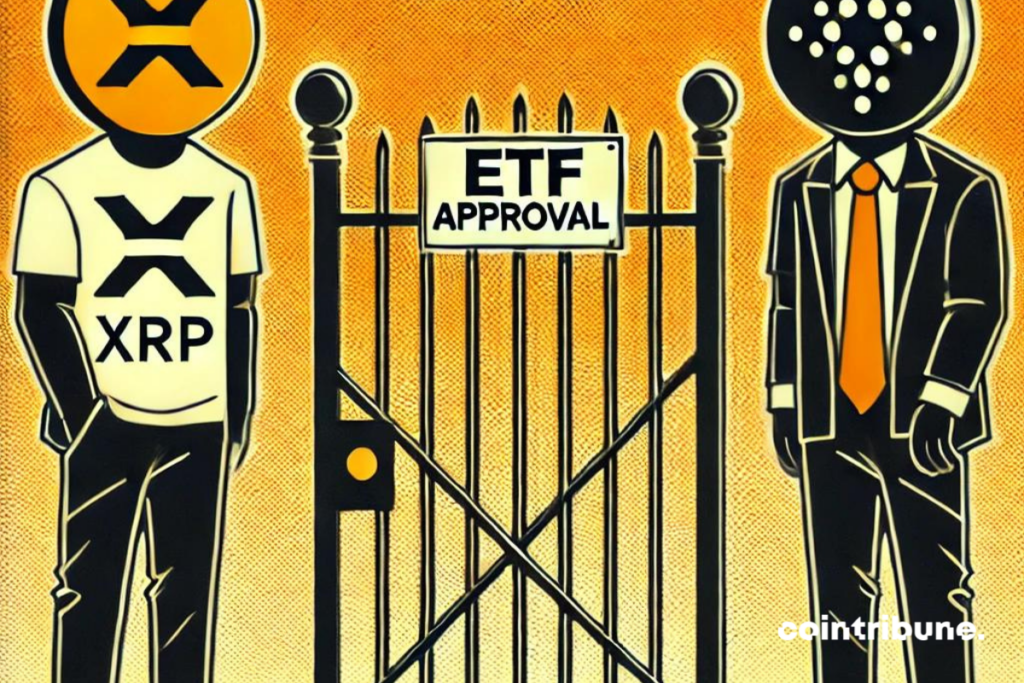Crypto: XRP and Cardano ETFs Are Not Likely To Be Launched Anytime Soon
Crypto ETFs are gaining momentum. However, for the XRP and Cardano communities, the wait might be extended further. A recent study by GSR reveals poor scores for these two assets, suggesting that the likelihood of seeing XRP and Cardano ETFs approved in the near future remains low. This analysis, based on rigorous decentralization and demand criteria, reveals significant structural weaknesses that hinder their potential for ETFs.

The obstacles to ETF approval for XRP and Cardano
The recent publication of the ETF probability score by GSR highlights the challenges faced by XRP and Cardano cryptocurrencies. The evaluation focuses on two main axes: decentralization and demand, each playing a very important role in the viability of an ETF.
Decentralization is a complex concept that encompasses permissionless participation, development control, token distribution, and material diversity. For XRP and Cardano, decentralization scores are particularly low, with -0.9 for XRP and -0.1 for Cardano, placing them respectively last and fifth among the evaluated cryptocurrencies. These scores indicate structural vulnerabilities that could compromise their ability to offer the necessary security and resilience for an ETF.
In parallel, demand is measured by indicators such as market capitalization, trading volume, and community activity. Again, XRP and Cardano show disappointing results with scores of -0.2 and -0.5, ranking fourth and sixth. These low demand scores for these two cryptos reflect a market dynamic and community attractiveness that are not sufficiently robust to support the creation of an ETF at this stage.
Reinforce decentralization and demand: A must-pass
GSR’s ETF probability score assigns a weight of 33% to decentralization and 67% to demand. And the results, from their study, highlight cryptos like Ethereum, Solana, and NEAR, which far surpass XRP and Cardano on these criteria, and underline a higher likelihood of ETF approval for these better-established and more in-demand assets. However, this does not mean that the situation is fixed.
Decentralization, although complex to improve, remains an area where progress is possible. For XRP and Cardano, increasing permissionless participation, better distributing the cryptos, and increasing the diversity of hardware used to secure the network could strengthen their position. Projects aimed at increasing decentralization must be supported by clear policies and concrete actions to gain the trust of regulators and investors.
On the demand front, an increase in market capitalization, higher trading volume for these two cryptos, and increased community activity are essential. These elements can be stimulated by technological innovations, strategic partnerships, and broader adoption of their respective platforms. Active engagement with the community and the creation of real-world use cases can also play a significant role in improving demand.
Maximize your Cointribune experience with our "Read to Earn" program! For every article you read, earn points and access exclusive rewards. Sign up now and start earning benefits.
Diplômé de Sciences Po Toulouse et titulaire d'une certification consultant blockchain délivrée par Alyra, j'ai rejoint l'aventure Cointribune en 2019. Convaincu du potentiel de la blockchain pour transformer de nombreux secteurs de l'économie, j'ai pris l'engagement de sensibiliser et d'informer le grand public sur cet écosystème en constante évolution. Mon objectif est de permettre à chacun de mieux comprendre la blockchain et de saisir les opportunités qu'elle offre. Je m'efforce chaque jour de fournir une analyse objective de l'actualité, de décrypter les tendances du marché, de relayer les dernières innovations technologiques et de mettre en perspective les enjeux économiques et sociétaux de cette révolution en marche.
The views, thoughts, and opinions expressed in this article belong solely to the author, and should not be taken as investment advice. Do your own research before taking any investment decisions.